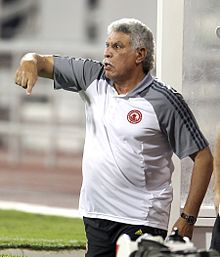 Shehata in 2012 | ||||||||||||||||||||||||||||||||||||||
| Personal information | ||||||||||||||||||||||||||||||||||||||
|---|---|---|---|---|---|---|---|---|---|---|---|---|---|---|---|---|---|---|---|---|---|---|---|---|---|---|---|---|---|---|---|---|---|---|---|---|---|---|
| Full name | Hassan Hassan Shehata | |||||||||||||||||||||||||||||||||||||
| Date of birth | 19 June 1947 | |||||||||||||||||||||||||||||||||||||
| Place of birth | Kafr El Dawwar, Beheira, Egypt | |||||||||||||||||||||||||||||||||||||
| Position(s) | Forward, attacking midfielder | |||||||||||||||||||||||||||||||||||||
| Youth career | ||||||||||||||||||||||||||||||||||||||
| Kafr El Dawar | ||||||||||||||||||||||||||||||||||||||
| Zamalek | ||||||||||||||||||||||||||||||||||||||
| Senior career* | ||||||||||||||||||||||||||||||||||||||
| Years | Team | Apps | (Gls) | |||||||||||||||||||||||||||||||||||
| 1966–1968 | Zamalek | |||||||||||||||||||||||||||||||||||||
| 1968–1973 | Kazma | (49) | ||||||||||||||||||||||||||||||||||||
| 1973–1982 | Zamalek | (77) | ||||||||||||||||||||||||||||||||||||
| International career‡ | ||||||||||||||||||||||||||||||||||||||
| 1970–1981 | Egypt[1] | 52 | (14) | |||||||||||||||||||||||||||||||||||
| Managerial career | ||||||||||||||||||||||||||||||||||||||
| 1983–1985 | Zamalek U20 | |||||||||||||||||||||||||||||||||||||
| 1985–1986 | Zamalek (assistant) | |||||||||||||||||||||||||||||||||||||
| 1986–1988 | Al-Wasl | |||||||||||||||||||||||||||||||||||||
| 1989–1990 | Al-Merreikh | |||||||||||||||||||||||||||||||||||||
| 1990–1992 | Ittihad El Shorta | |||||||||||||||||||||||||||||||||||||
| 1992–1993 | Al Ittihad Alexandria | |||||||||||||||||||||||||||||||||||||
| 1993–1994 | Ittihad El Shorta | |||||||||||||||||||||||||||||||||||||
| 1995–1996 | Zamalek (assistant) | |||||||||||||||||||||||||||||||||||||
| 1996–1997 | El Minya | |||||||||||||||||||||||||||||||||||||
| 1997–1998 | El Sharkia | |||||||||||||||||||||||||||||||||||||
| 1998–1999 | El Shams | |||||||||||||||||||||||||||||||||||||
| 1999 | Al-Ahly Benghazi | |||||||||||||||||||||||||||||||||||||
| 1999–2000 | Suez | |||||||||||||||||||||||||||||||||||||
| 2000 | Al-Fujairah | |||||||||||||||||||||||||||||||||||||
| 2001 | Dina Farms[2] | |||||||||||||||||||||||||||||||||||||
| 2001–2003 | Egypt U20 | |||||||||||||||||||||||||||||||||||||
| 2003–2004 | El Mokawloon | |||||||||||||||||||||||||||||||||||||
| 2004–2011 | Egypt | |||||||||||||||||||||||||||||||||||||
| 2011–2012 | Zamalek | |||||||||||||||||||||||||||||||||||||
| 2012 | Al-Arabi | |||||||||||||||||||||||||||||||||||||
| 2014 | Difaâ El Jadidi | |||||||||||||||||||||||||||||||||||||
| 2014–2015 | El Mokawloon | |||||||||||||||||||||||||||||||||||||
| 2015–2016 | Petrojet | |||||||||||||||||||||||||||||||||||||
| 2018–2020 | FC Mauerwerk (technical advisor) | |||||||||||||||||||||||||||||||||||||
Medal record
| ||||||||||||||||||||||||||||||||||||||
|
*Club domestic league appearances and goals, correct as of 15 February 2023 ‡ National team caps and goals, correct as of 15 February 2023 | ||||||||||||||||||||||||||||||||||||||
Hassan Shehata (Egyptian Arabic: حسن شحاتة; born 19 June 1947) is an Egyptian retired football manager and former professional football player who played as a forward. He is considered as one of the best forwards in the history of African football.[3][4] He was nicknamed the "Master".[5] As a manager, Shehata led Egypt to three consecutive Africa Cup of Nations titles, in 2006, 2008 and 2010. He is the first ever coach to win three consecutive Africa Cup of Nations titles.
Shehata is one of only two coaches to win the Africa Cup three times, along with Ghana's Charles Gyamfi. As a player, Shehata is widely regarded the best of his generation. He is considered one of the greatest Egyptian footballers of all time. He scored some memorable goals that lived in the fans' memories. The songs and chants that the fans sang in his name are considered eternal in the memory of football fans in Egypt. Shehata started his career in Zamalek, he played almost his whole career with the Cairo giants. He was a prolific goal scorer and is considered one of Zamalek's top scorers of all-time. In 1974, Shehata came 3rd in the African Player of the Year by France Football. Despite not winning the Africa Cup of Nations with Egypt as a player and only obtaining a bronze medal in the 1974 edition, however, as a manager, he won the title three consecutive times, becoming the only manager to make this achievement.[6]
He stated in a press release that he is proud to be affiliated with the Zamalek Club, and stressed that he had spent the best days of his life inside the White Castle (Zamalek), and he was associated with great players during his career as a player in the team. Shehata pointed out that he is very proud of the Zamalek fans, who created the fame and stardom of all the players who played for the club throughout its long history, and that he considers the Zamalek fans to be the number one player in the system, and their support for the team has not differed over the ages.[7][8]
- ^ Hassan Shehata - International Appearances
- ^ "اخبار |قبل مواجهة أهلي جاريدو .. شحاتة يكتسح المدرب الأجنبي في الدوري المصري". FilGoal. 27 April 2015. Retrieved 27 December 2015.
- ^ "How Hassan Shehata carved a place for himself in pantheon of Egyptian greats". 29 June 2023.
- ^ أحمد عمارة (19 June 2020). "في عيد ميلاده الـ 73.. أرقام قياسية في مسيرة «المعلم» حسن شحاتة لاعبًا ومدربًا".
- ^ AbdelAziz, Omar (29 December 2011). "Play of the Week: Master Shehata". FilGoal.com (in Arabic). Retrieved 16 April 2024.
- ^ كريم أبو حسـين (24 September 2021). "عضو لجنة الزمالك : حسن شحاته أفضل لاعب في تاريخ مصر وليس محمود الخطيب".
- ^ وائل عباس (14 January 2024). "المعلم» حسن شحاتة: النادى صاحب الفضل فى صناعة تاريخى".
- ^ "A Story of a Legendary Player and Coach | Sada Elbalad". see.news. Retrieved 16 April 2024.